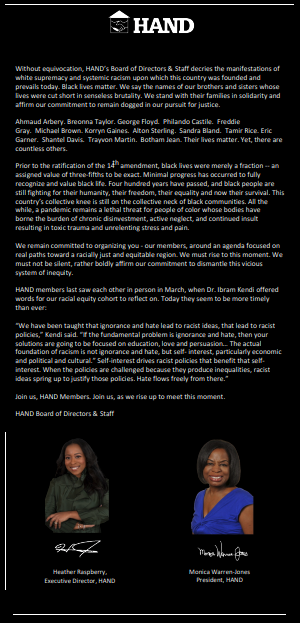HAND is committed to reaching beyond the symptoms of inequity to address the root causes that amplify housing disparities and restrict access to opportunity for communities of color. In light of protests against police brutality and the continued impacts of systemic racism, HAND leadership issued a statement titled “Why HAND Chose to Place Racial Equity at the Center of Our Work.”
Below you’ll find a collection of various resources for our members and partners who are committed to learning and taking action to center their organization’s work around racial equity. This is by no means an exhaustive list, but you will find a variety of content to explore – from articles to more in-depth books and podcasts. Topics below include structural racism, implicit bias, white privilege, mass incarceration, and most importantly – operationalizing racial equity. We encourage you to take advantage of this material and we look forward to engaging with you as we rise to this moment.
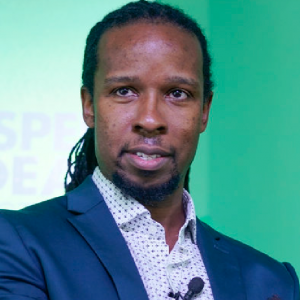
Session 1: Structural Racism
Ibram X. Kendi, Author
How to Be an Antiracist

Session 2: Implicit Bias
Julie Nelson, Director
Government Alliance on Race & Equity, Haas Institute for a Fair and Inclusive Society
 Session 3: White Privilege
Session 3: White Privilege
Robin DiAngelo, Ph.D., Author
White Fragility: Why It’s So Hard for White People to Talk About Racism

 Session 4: So What? What Now? Operationalizing Racial Equity
Session 4: So What? What Now? Operationalizing Racial Equity
Ronald Galvin, VP, Racial Equity and the Democratic Economy, The Democracy Collaborative
Angela Carlberg, Project Manager, The Democracy Collaborative
Looking for a consultant team to help your organization to center your work around racial equity?
VP, Racial Equity and the Democratic Economy
Email | Website
Structural Racism

The 1619 Project:
An ongoing initiative from The New York Times Magazine that began in August 2019, the 400th anniversary of the beginning of American slavery.
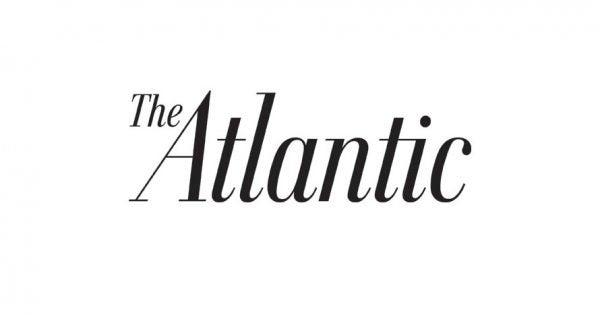
The Case for Reparations
Story By Ta-Nehisi Coates
“Until we reckon with our compounding moral debts, America will never be whole.”

11 Terms You Should Know to Better Understand Structural Racism
This glossary describes terms related to structural racism and terms used to promote racial equity analysis.
The difference between being “not racist” and antiracist | Ibram X. Kendi
PBS: The African Americans: Many Rivers to Cross – Survey the full sweep of African-American history with Henry Louis Gates, Jr.
American Public Health Association has created a list of states, cities and counties that are naming racism as a determinant of health.

Race Forward: “What is Systemic Racism”
This video series 8-part video series that shows how racism shows up in our lives across institutions and society.
Implicit Bias
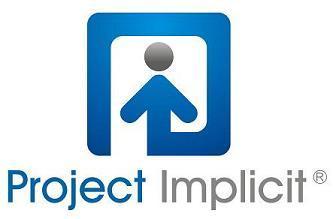
Project Implicit
A series of Implicit Association Tests that reports on your attitudes and beliefs about various topics including different people groups.

Look Twice
by Susan Fiske
“Prejudice might be hardwired in our brains. But the good news is that we can still learn to override our prejudices and embrace difference.”

Where Bias Begins: The Truth About Stereotypes
by Annie Murphy Paul
Stereotyping is not limited to those who are biased. We all use stereotypes all the time. They are a kind of mental shortcut.
White Fragility and Privilege

Are You Willing to Give Up Your Privilege?
By Darren Walker
“Instead, those of us with power and privilege must grapple with a more profound question: What are we willing to give up?”
Dr. Robin DiAngelo discusses ‘White Fragility’

Maintaining Professionalism In The Age of Black Death Is…A Lot
By Shanequa Golding
“I just witnessed the lynching of a black man, but don’t worry Ted, I’ll have those deliverables to you end of day.”
Tim Wise on Dominant Cultural Norms vs. Universal Norms – Saskatoon, SK, March 2011
White Privilege: Unpacking the Invisible Knapsack
by Peggy McIntosh
“I was taught to see racism only in individual acts of meanness, not in invisible systems conferring dominance on my group”
Mass Incarceration

Netflix Film: 13th
In this thought-provoking documentary, scholars, activists and politicians analyze the criminalization of African Americans and the U.S. prison boom.
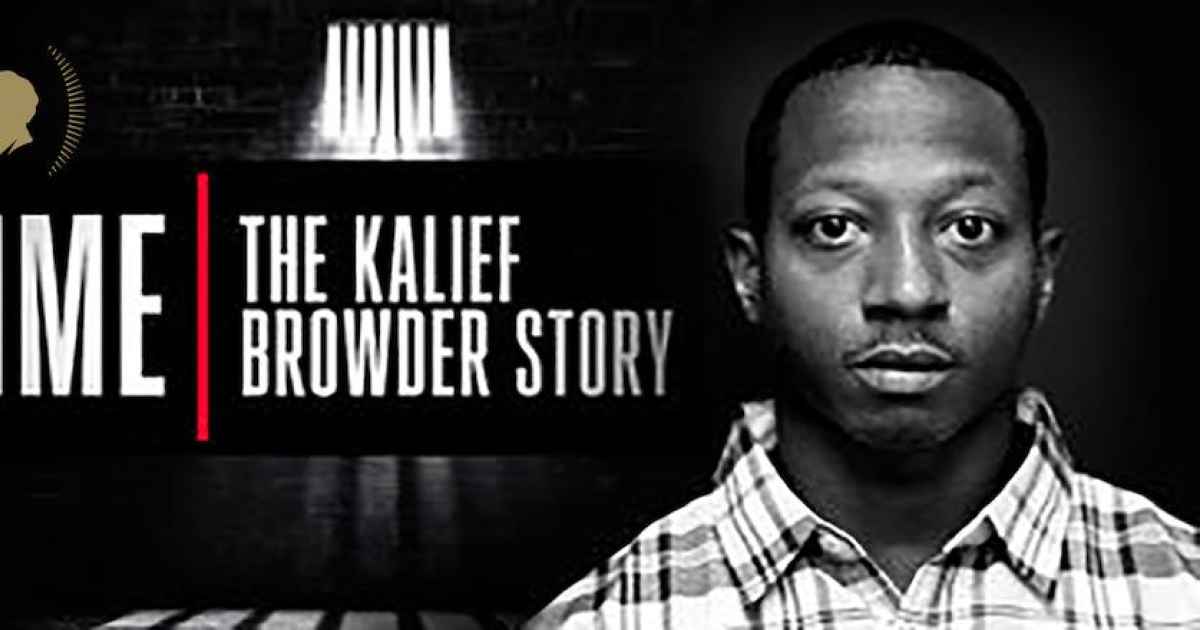
Netflix Film: Time: The Kalief Browder Story
This series traces the tragic case of Kalief Browder, a Black Bronx teen who spent three horrific years in jail, despite note being convicted of a crime.

Netflix Film: When They See Us
Five teens from Harlem become trapped in a nightmare when they’re falsely accused of a brutal attack in Central Park. Based on the true story.
Array 101:
A learning companion resource written by Director Ava DuVernay based around the TV Series “When They See Us”

The W. Haywood Burns Institute
The Burns Institute eliminates racial and ethnic disparity by building a community-centered response to youthful misbehavior that is equitable and restorative.
Operationalizing Racial Equity
Awake to Woke to Work was published by Equity in the Center to support organizations create deep social impact by helping them build Race Equity Culture.
How Slavery Inspired Modern Business Management
by Caitlin C. Rosenthal
“…The business history of plantation slavery is a cautionary tale of what profit-seeking can look like when everything, including lives, is up for sale.”
“Why I Don’t Bring My ‘Whole Self’ to Work”
by Jonathan Jackson
“…Before I leave the house in the morning, I let the dog out, empty the trash, and then neatly fold the other 60 percent of myself into a drawer.”
“The Curb-Cut Effect”
by Angela Glover Blackwell
Laws and programs designed to benefit vulnerable groups, such as the disabled or people of color, often end up benefiting all of society.

A Long Way to Go: What Kind of Change is Needed Within Foundations to Advance Racial Equity?
by Michael Hamill Remaley
“Listening to communities isn’t the same as giving up decision-making control, of course.”

The Case for Accelerating Financial Inclusion in Black Communities
by Aria Florant, JP Julien, Shelley Stewart, Nina Yancy, and Jason Wright
“A lack of financial inclusion for black Americans exists at every level of the financial system. Understanding the sources of exclusion is the first step to fixing the system.”
Competitive Advantage of Racial Equity
By Angela Glover Blackwell, Mark Kramer, Lalitha Vaidyanathan, Lakshmi Iyer, and Josh Kirschenbaum
“Corporate America is missing out on one of the biggest opportunities of our time for driving innovation and growth: creating business value by advancing racial equity.”

The 2% Solution: Inside Billionaire Robert Smith’s Bold Plan to Funnel Billions to America’s Black-Owned Businesses
by Nathan Vardi
“Now, Smith believes his playbook for economic justice could not only ensure Black Americans have better access to opportunity, but also increase the nation’s economic activity by more than $1 trillion annually.”
Reading/Listening List
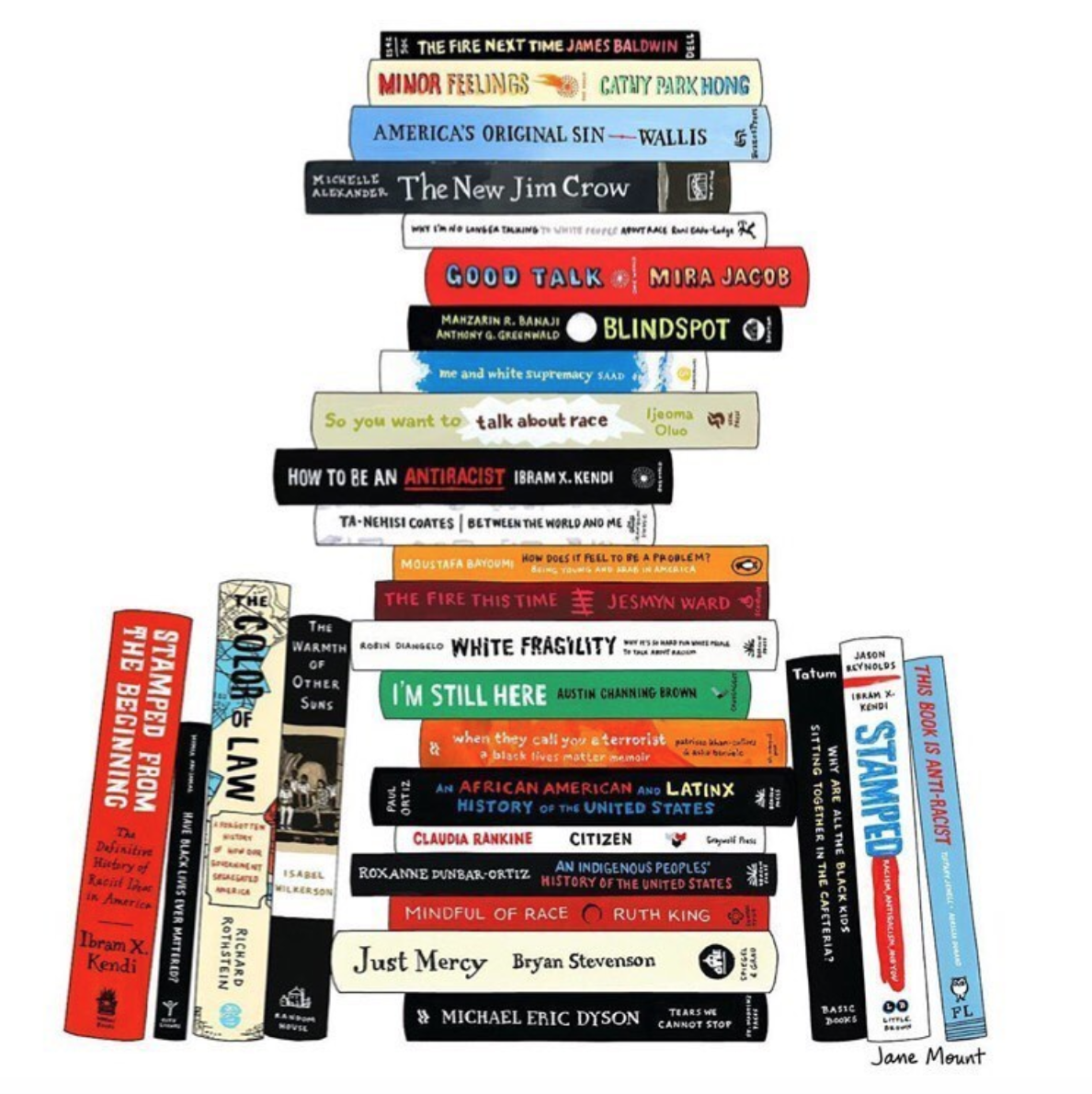
Book List
- How To Be An Antiracist by Dr. Ibram X. Kendi
- Invisible No More: Police Violence Against Black Women and Women of Color by Andrea J. Ritchie
- Just Mercy by Bryan Stevenson
- Raising Our Hands by Jenna Arnold
- Redefining Realness by Janet Mock
- So You Want to Talk About Race by Ijeoma Oluo
- The Bluest Eye by Toni Morrison
- The Fire Next Time by James Baldwin
- The New Jim Crow: Mass Incarceration in the Age of Colorblindness
by Michelle Alexander - The Warmth of Other Suns by Isabel Wilkerson
- Their Eyes Were Watching God by Zora Neale Hurston
- White Fragility: Why It’s So Hard for White People to Talk About Racism by Robin DiAngelo, PhD
- 1619 (New York Times)
- About Race
- Code Switch (NPR)
- Intersectionality Matters! hosted by Kimberlé Crenshaw
- Momentum: A Race Forward Podcast
- Pod For The Cause (from The Leadership Conference on Civil & Human Rights)
- Seeing White
Films and TV series to watch:
- 13th
- American Son
- Black Power Mixtape: 1967-1975
- Blindspotting
- Clemency
- Dear White People
- Fruitvale Station
- I Am Not Your Negro
- Just Mercy
- Selma
- The Black Panthers: Vanguard of the Revolution
- The Hate U Give
- When They See Us


